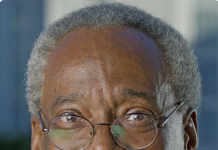The Finnish trial of the Bible has concluded before the Helsinki Court of Appeal, where longstanding parliamentarian and former government minister Päivi Räsänen stood trial on charges of “hate speech” on account of three expressions of her Christian faith – in a tweet, in a 2004 church pamphlet, and in a 2019 radio interview. The medical doctor and grandmother of ten was charged for “agitation against a minority group”, a provision that falls under the section of the Finnish Criminal Code titled “War Crimes and Crimes Against Humanity.”
“I’m hopeful that all these charges will be acquitted. It’s a very important verdict for freedom of speech and of religion and Finland, and also has consequences across Europe, but I’m hopeful for a good result,” said Räsänen upon leaving the court.
Räsänen’s tweet, which began a lengthy police investigation which brought forth three charges, challenged her Church leadership as to their justification for sponsoring a Pride event. She attached a picture of a Bible verse from Romans.
The court is expected to deliver a verdict by November 30th.
“You can cite the Bible”…but certain “opinions” about it are “criminal”
The prosecutor commented in her opening statement that “the authors of the Bible are not indicted” today, but those who interpret what he said literally are: “You can cite the Bible, but it is Räsänen’s interpretation and opinion about the Bible verses that are criminal.”
Throughout her cross-examination this morning, Räsänen was asked multiple times by the prosecutor if she would update or remove what she had said about marriage and sexuality in her 2004 church pamphlet, titled “Male & Female He Created Them”.
“The gist of the State prosecutor’s examination of Päivi was this: would she recant her beliefs? The answer was no – she will not deny the teachings of her faith. Dragging an individual through a grueling criminal trial simply for expressing their religious beliefs is not a marker of democracy and “progress” . We will continue to stand with Päivi and await the decision of the court as to whether expressing Biblical teaching is really a crime in Finland,” commented Paul Coleman, Executive Director of ADF International who are backing Päivi’s legal defense.
The prosecution further argued that the intent behind the expression of faith was irrelevant. Räsänen should have known, said the state prosecutor, that her words could be offensive to certain people and therefore refrained from speaking. Neither did it matter, according to the prosecutor, if what she had written was “true”; what mattered was that it was insulting.
Räsänen’s defence team, co-ordinated by ADF International, highlighted the strong protection that freedom of speech enjoys in international law, as well as being an integral part of Finnish democracy. They submitted to the court that her use of the word “sin” in her tweet – which the prosecutor had highlighted as “insulting” and therefore unlawful -was quoted directly from the Bible, and any judgement condemning its usage would directly condemn the Bible itself.
Freedom to speak, and Freedom not to Listen
Also standing trial was Bishop Juhana Pohjola, who was charged with “hate speech” for publishing the 2004 pamphlet which Räsänen had written.
Taking the stand, the Bishop highlighted that the pamphlet stated the equal worth and dignity of each person, no matter their sexuality.
Speaking to the Court, he noted: “Condemning sinful deeds does not mean questioning a person’s worth and dignity. These are completely different things. The prosecutor is propagating an understanding that is fully against the Christian understanding. Condemning sin does not question a person’s dignity.”
Explaining the need for free speech within a democracy, the Bishop further commented, “The very idea of religious freedom is that you are free to teach the Christian message, even if someone finds it offensive, but then you can exercise your right not to listen.”
The Bishop further added that he would not seek the censorship of teachings that offended him.










